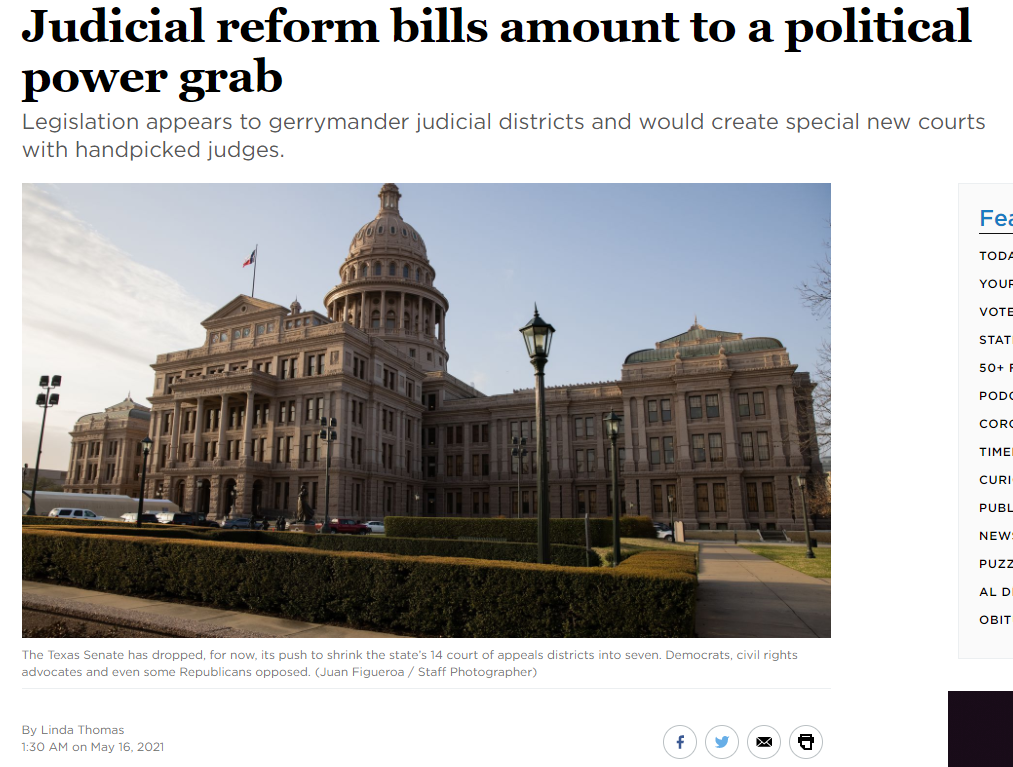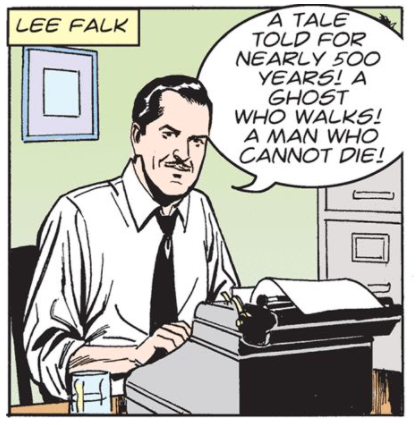No disclaimer found when: “[T]he specific misrepresentations about which Amy complains, that Paul said he was walking away from the title business but was actually accepting a bonus and a well-paid position with Alamo, were not referenced in the agreement and were not disclosed to Amy. Thus, we reject the Mundheims’ argument that the disclaimer-of-reliance provision in the agreement was binding to preclude Amy from asserting she relied on the Mundheims’ misrepresentations when she entered the agreement.” Mundheim v. Lepp, No. 05-19-01490-CV (May 13, 2021) (mem. op.).
Monthly Archives: May 2021
This timeline led the Fifth Court to deny a request for leave to file a late notice of appeal:
- December 15, 2020. Trial court signs a final divorce decree.
- January 14, 2021. Appellants first learn of the decree by seeing it on the court’s docket. They file a motion for new trial that same day.
- March 15, 2021 became the new deadline for filing a notice of appeal.
- March 25, 2021 was when Appellants filed their notice of appeal.
The Court found the grounds in the motion for leave unpersuasive, noting: “[A]lthough counsel and her firm may have been preoccupied with other matters between February 15 and March 5, and counsel may have been busy handling an emergency after that time, appellants fail to explain how this prevented them from timely filing the notice of appeal.” In the Interest of D.M., No. 05-21-00185-CV (May 21, 2021) (mem. op.).
 Cooper v. Cooper presented an issue about the entry of a consent judgment after one of the parties withdrew its approval. The Fifth Court found that by the time judgment was rendered, the trial court was on notice about the issue with that party’s consent, making it an abuse of discretion to proceed to entry of judgment based on the earlier agreement. No. 05-20-00507-CV (May 4, 2021) (mem. op.) This topic can be surprisingly challenging in Texas state practice given the wide range of agreements covered by Tex. R. Civ. P. 11 — this is a 2019 article that I co-authored about some of those procedural issues.
Cooper v. Cooper presented an issue about the entry of a consent judgment after one of the parties withdrew its approval. The Fifth Court found that by the time judgment was rendered, the trial court was on notice about the issue with that party’s consent, making it an abuse of discretion to proceed to entry of judgment based on the earlier agreement. No. 05-20-00507-CV (May 4, 2021) (mem. op.) This topic can be surprisingly challenging in Texas state practice given the wide range of agreements covered by Tex. R. Civ. P. 11 — this is a 2019 article that I co-authored about some of those procedural issues.
 Brown v. Daniels presents a detailed review of allegations against the Dallas County Sheriff’s office about the operation of the county jail during the COVID-19 pandemic; the Fifth Court ruled for the sheriff in all respects, reversing the denial of her plea to the jurisdiction, and rendering a judgment of dismissal. No. 05-20-00579-CV (May 19, 2021) (mem. op.).
Brown v. Daniels presents a detailed review of allegations against the Dallas County Sheriff’s office about the operation of the county jail during the COVID-19 pandemic; the Fifth Court ruled for the sheriff in all respects, reversing the denial of her plea to the jurisdiction, and rendering a judgment of dismissal. No. 05-20-00579-CV (May 19, 2021) (mem. op.).
Retail Services WIS Corp. v. Crossmark, Inc., a preliminary-injunction case involving the alleged misuse of trade secrets, made these observations (among others):
- Trade secret existence. The plaintiff adequately established the existence of a trade secret with testimony that “(1) Crossmark possesses information it considers confidential, including playbooks and digital transformation strategies, that would give a competitor ‘insight into what we’re working on’ and an opportunity ‘to cut corners and create a shortcut to allow them to be able to compete effectively and potentially even, you know, take it further faster than we are’; 2) Crossmark takes multiple steps to protect that information, including limiting access and requiring employees to sign confidentiality agreements; and (3) the digital demo display customers see in stores is ‘just the tip of the iceberg’ and does not constitute the entirety of Crossmark’s strategy.“
- Order specificity. While the Court said that “much of th[e] provision is conclusory” that described the harm justifying the injunction, it concluded: “[T]wo portions address ‘reasons why’ Crossmark will suffer irreparable injury: ‘because once CROSSMARK trade secrets are improperly used and disclosed, they are forever lost and such loss is cannot be calculated in money damages’ and ‘CROSSMARK’s customer and client goodwill, which has been developed over many years, will be harmed and such harm cannot be quantified in money damages.'”
The Court went on to identify a number of problems with the specificity of the enjoined acts, as well as the requirement that certain electronic storage devices be turned over, and the details of those holdings will be reviewed in a future post. No. 05-20-00937-CV (May 4, 2021) (mem. op.).
 The Fifth Court’s former Chief Justice, Linda Thomas, wrote an excellent op-ed in this weekend’s Dallas Morning News about recent efforts to restructure the Texas court system.
The Fifth Court’s former Chief Justice, Linda Thomas, wrote an excellent op-ed in this weekend’s Dallas Morning News about recent efforts to restructure the Texas court system.
 “[R]eal parties expressly renounced their contractual right to a nonjury trial when they repeatedly demanded a jury and paid the jury fee. Having done so, they cannot ask this Court to enforce that contractual right by mandamus. Relator was entitled to rely upon real parties’ conduct. And the record establishes that relator did rely on real parties’ conduct: relator never objected to real parties’ jury demands, and when real parties first indicated the possibility of asserting their contractual right by filing the Notice, relator immediately filed its own jury demand and fee.” In re PlainsCapital Bank, No. 05-20-00765-CV (May 13, 2021) (mem. op.).
“[R]eal parties expressly renounced their contractual right to a nonjury trial when they repeatedly demanded a jury and paid the jury fee. Having done so, they cannot ask this Court to enforce that contractual right by mandamus. Relator was entitled to rely upon real parties’ conduct. And the record establishes that relator did rely on real parties’ conduct: relator never objected to real parties’ jury demands, and when real parties first indicated the possibility of asserting their contractual right by filing the Notice, relator immediately filed its own jury demand and fee.” In re PlainsCapital Bank, No. 05-20-00765-CV (May 13, 2021) (mem. op.).
“The temporary injunction before us does not include an order setting the case for trial on the merits with respect to the ultimate relief sought. Therefore, the order does not comply with [Tex. R. Civ. P. 683], is void, and must be dissolved.” City of Dallas v. Stamatina Holdings LLC, No. 05-20-00975-CV (May 7, 2021) (mem. op.).
In JLB Builders LLC v. Hernandez, the Texas Supreme Court reversed an en banc Fifth Court opinion about a construction-site accident. The issue was the general contractor’s right of control over the workplace, and the supreme court reached these conclusions about key aspects of that issue (all emphasis added):
- Direction. “Hernandez references his additional testimony that he had previously seen JLB supervisors talking to [the subcontractor’s] foremen and that the supervisors ‘appear[ed] to be giving instructions as to how our jobs were to be done.’ Without more, evidence of what JLB generally ‘appeared’ to be doing is no evidence that it was exercising actual control over the details of the injury-causing work.”
- Safety requirements. “A general contractor that promulgates mandatory safety requirementsand procedures owes only a narrow duty to ensure that those requirements and procedures generally do not ‘unreasonably increase, rather than decrease, the probability and severity of injury.'”
- Direction. “[T]here is no indication that JLB was aware that the wind posed a particular danger that day, and the testimony that JLB employees ‘could watch’ the supports being secured is not evidence that they did so or that they were aware the supports were improperly secured.”
(In my three-part system for categorizing Texas intermediate-court en banc opinions, JLB Builders would be a “successful failure,” in that it drew supreme court attention but for the purpose of reversal.)
Service was inadequate to support a default judgment when: “The record before us shows the citation was addressed to ‘U.S. Bank Trust, N.A.’ However, the defendant in the action and the party against whom the default judgment was taken is ‘U.S. Bank Trust, N.A., as Trustee for LSF8 Master Participation Trust.’ There is no evidence in the record that service was had upon ‘U.S. Bank Trust, N.A., as Trustee for LSF8 Master Participation Trust.'” U.S. Bank Trust, N.A. v. AJ & Sal Enterprises, LLC, No. 05-20-00346-CV (April 30, 2021) (mem. op.).
 Continuing the shower of spring en banc opinions from the Fifth Court, an eight-justice majority concluded that any “substantive nexus” between the relevant safety standards and health care was too attenuated to implicate the Texas Medical Liability Act on the following facts: “On May 25, 2014, Faber went to pick her mother up at Dayspring [Assisted Living Community] to take her to a hair styling appointment. Faber parked in Dayspring’s parking lot and asked a Dayspring employee to help Millie to the car. Millie, who had become a Dayspring resident only a week earlier, used a rolling walker and sat on it facing backwards as the Dayspring employee pushed her along the public sidewalk outside Dayspring’s entrance. Millie’s walker got caught in a large crack in the sidewalk, causing her to fall and hit her head on the concrete.”
Continuing the shower of spring en banc opinions from the Fifth Court, an eight-justice majority concluded that any “substantive nexus” between the relevant safety standards and health care was too attenuated to implicate the Texas Medical Liability Act on the following facts: “On May 25, 2014, Faber went to pick her mother up at Dayspring [Assisted Living Community] to take her to a hair styling appointment. Faber parked in Dayspring’s parking lot and asked a Dayspring employee to help Millie to the car. Millie, who had become a Dayspring resident only a week earlier, used a rolling walker and sat on it facing backwards as the Dayspring employee pushed her along the public sidewalk outside Dayspring’s entrance. Millie’s walker got caught in a large crack in the sidewalk, causing her to fall and hit her head on the concrete.”
 A 5-justice dissent saw otherwise: “The facts that form the basis of Faber’s suit show that Smith did not simply trip over a crack in the sidewalk. Instead, she fell because a staff member of the health care institution in which she resided pushed her over a crack in the sidewalk while she was seated in a wheeled walker causing her to fall. Because of this, Faber’s claim is inextricably intertwined with the conduct of, and duties owed by, Collin Creek as a health care provider.” Faber v. Collin Creek Assisted Living Center, No. 05-18-00827-CV (May 3, 2021).
A 5-justice dissent saw otherwise: “The facts that form the basis of Faber’s suit show that Smith did not simply trip over a crack in the sidewalk. Instead, she fell because a staff member of the health care institution in which she resided pushed her over a crack in the sidewalk while she was seated in a wheeled walker causing her to fall. Because of this, Faber’s claim is inextricably intertwined with the conduct of, and duties owed by, Collin Creek as a health care provider.” Faber v. Collin Creek Assisted Living Center, No. 05-18-00827-CV (May 3, 2021).
 The Phantom, longtime defender of Bangalia, is often called the “Man Who Cannot Die.” Neither do disputes about the scope of issue statements; in a counterpoint to a recent opinion that read Flakes narrowly, the Fifth Court rejected a Flakes-based objection to a charge-error issue: “Following the supreme court’s mandate, we conclude that, fairly subsumed in Ziehl’s briefing, is the challenge to the trial court’s judgment awarding contribution to all parties who failed to secure a statutorily required jury instruction.” Ziehl v. Tornado Bus, No. 05-19-00901-CV (April 22, 2021) (mem. op.).
The Phantom, longtime defender of Bangalia, is often called the “Man Who Cannot Die.” Neither do disputes about the scope of issue statements; in a counterpoint to a recent opinion that read Flakes narrowly, the Fifth Court rejected a Flakes-based objection to a charge-error issue: “Following the supreme court’s mandate, we conclude that, fairly subsumed in Ziehl’s briefing, is the challenge to the trial court’s judgment awarding contribution to all parties who failed to secure a statutorily required jury instruction.” Ziehl v. Tornado Bus, No. 05-19-00901-CV (April 22, 2021) (mem. op.).
 The defendants in Chen v. Razberi Technologies lost a special appearance and took an interlocutory appeal. But before resolution of the appeal, the trial court entered final judgment against the defendants, who did not file an additional notice of appeal. A Fifth Court panel concluded that “[t]he special appearance order merged into the final judgment mooting this interlocutory appeal. ” In later proceedings, the Court denied en banc review, over a detailed dissent. No. 05-19-01551-CV (April 28, 2021).
The defendants in Chen v. Razberi Technologies lost a special appearance and took an interlocutory appeal. But before resolution of the appeal, the trial court entered final judgment against the defendants, who did not file an additional notice of appeal. A Fifth Court panel concluded that “[t]he special appearance order merged into the final judgment mooting this interlocutory appeal. ” In later proceedings, the Court denied en banc review, over a detailed dissent. No. 05-19-01551-CV (April 28, 2021).